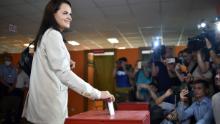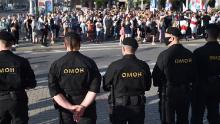
[ad_1]
“I believe my own eyes, the majority was for us,” Tikhanovskaya said in a news conference on Monday, according to multiple local media reports. “We do not recognize the election results. We have seen real protocols. We urge those who believe that their voice was stolen not to remain silent.”
The Central Election Commission in Belarus announced Monday that preliminary results show Lukashenko won with 80.23% of the vote, while Tikhanovskaya stands at 9.9%.
Riots erupted across the country after official exit polls released late Sunday gave the victory to Lukashenko.
They ended with around 3,000 people detained and dozens injured during clashes with police, the interior ministry said in a statement seen by state-run news agency Belta.
Critics have voiced concerns about widespread ballot stuffing and falsifications. Independent monitoring group “Honest people” said at Tikhanovskaya’s press conference that, according to their data, she won in at least 80 polling stations across Belarus.
Tikhanovskaya, 37, added that she was ready to meet Lukashenko to discuss bringing “peaceful change of power.”
Her campaign has said it is “ready for long-term protests” and that it will demand a recount.
Monitoring organization Golos said it counted more than a million ballots and, according to its calculations, Tikhanovskaya won 80% of the vote.
Lukashenko said on Monday that he would not “allow the country to be torn apart,” claiming that the protests were initiated by “foreign puppeteers,” Belta reported.
He added that law enforcement would not back down, and questioned why he would transfer power to the opposition given the preliminary election results.
“Riot officers were wounded, there are broken arms and legs. These guys were deliberately hit and they have pushed back. Why sob and cry now? The response will be adequate,” Lukashenko said.
“So Lukashenko — who is at the top of the vertical of power, the head of the state, voluntarily, with 80% of the votes — must transfer power to them? This is all coming from abroad,” Lukashenko said.
‘Europe’s last dictator’
Tikhanovskaya, a former English tutor, became an unexpected rival to Lukashenko, and the face of the opposition after taking over from her husband, Sergey Tikhanovskiy, a popular YouTube blogger and former candidate who has been jailed since May.
Her campaign rallies saw significant turnouts even in small Belarusian towns not known for their protest activity. About 63,000 people attended the largest event in Minsk in July — making it the biggest demonstration in the past decade.
Tikhanovskaya joined forces with two women who ran other opposition campaigns after their candidates were also either barred from running or jailed. Lukashenko had dismissed them as “poor girls” in his annual state of the union address on Tuesday and said he will not “give the country away.”
Tikhanovskaya’s campaign manager Maria Kolesnikova was also taken to a police station for questioning on the eve of the vote. A day before that, campaign manager Maria Moroz was briefly detained.
Tikhanovskaya first disputed the results at a news conference late Sunday, with her campaign maintaining that she had won in dozens of polling stations in Minsk at that stage.
On Monday, the chief of the European Council criticized Belarus for attempting to quash protests. “Violence against protesters is not the answer Belarus,” Charles Michel said on Twitter. “Freedom of speech, freedom of assembly, basic human rights must be upheld.”
Nicknamed “Europe’s last dictator,” Lukashenko has ruled the former Soviet republic of more than 9 million people since 1994. He has long drawn international criticism for suppressing dissent, and the country’s secret police — still known as the KGB — often detain and harass opposition activists and independent journalists.
Framed as one of the toughest challenges to Lukashenko’s 26-year-long rule, it was the Belarus strongman’s sixth reelection campaign.
The poll saw a massive turnout, according to official data, with the country’s Central Election Commission saying Monday that the official turnout was at 84.23%.
Observers barred
Yet internet access has been largely restricted, and was completely shut down in central Minsk, according to local reports.
NetBlocks, an NGO that tracks internet shutdowns worldwide, said in a tweet late Sunday, “Multiple internet providers in #Belarus have lost routing as polling stations start to close from 8:00 p.m; geolocated network data confirm the new disruption has nation-scale impact further limiting visibility of events.”
Most apps and websites were taking longer to load, including Whatsapp, Viber, and Facebook Messenger. Telegram Messenger, which serves as the main communication tool for the Belarusian opposition, was unavailable at times or only accessible via proxy servers.
Independent observers in Belarus, such as the “Honest people” group, said they had also found significant discrepancies between the officially announced turnout and the number of people entering polling stations that they were able to count.
Most independent observers were barred from monitoring the election. Dozens of independent observers were detained on Saturday and early Sunday, according to the “Honest people” and “Right to choose” initiatives.
The Organization for Security and Cooperation in Europe said in July it would not be sending observers to Belarus as it hadn’t been invited by the country’s authorities.
The foreign ministries of France, Germany and Poland said they would be monitoring the elections with “great concern” due to “worrying reports of electoral irregularities during early voting.” The three countries said the European Council was also not allowed to oversee the electoral process.
Journalist Mikalai Anishchanka in Minsk and CNN’s Barbara Wojazer contributed.
[ad_2]
Source link



